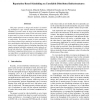Free Online Productivity Tools
i2Speak
i2Symbol
i2OCR
iTex2Img
iWeb2Print
iWeb2Shot
i2Type
iPdf2Split
iPdf2Merge
i2Bopomofo
i2Arabic
i2Style
i2Image
i2PDF
iLatex2Rtf
Sci2ools
118
click to vote
ICDCS
2006
IEEE
2006
IEEE
Reputation-Based Scheduling on Unreliable Distributed Infrastructures
This paper presents a design and analysis of scheduling techniques to cope with the inherent unreliability and instability of worker nodes in large-scale donation-based distributed infrastructures such as P2P and Grid systems. In particular, we focus on nodes that execute tasks via donated computational resources and may behave erratically or maliciously. We present a model in which reliability is not a binary property but a statistical one based on a node’s prior performance and behavior. We use this model to construct several reputation-based scheduling algorithms that employ estimated reliability ratings of worker nodes for efficient task allocation. Through simulation of a BOINC-like distributed computing infrastructure, we demonstrate that our algorithms can significantly improve throughput, while maintaining a very high success rate of task completion.
Distributed And Parallel Computing | Donation-based Distributed Infrastructures | ICDCS 2006 | Reputation-based Scheduling Algorithms | Worker Nodes |
| Added | 11 Jun 2010 |
| Updated | 11 Jun 2010 |
| Type | Conference |
| Year | 2006 |
| Where | ICDCS |
| Authors | Jason D. Sonnek, Mukesh Nathan, Abhishek Chandra, Jon B. Weissman |
Comments (0)

